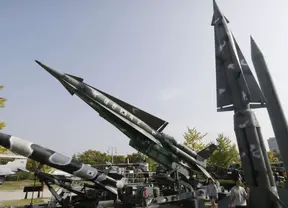
South Korea’s ruling Democratic Party has put forward the possibility of returning the controversial THAAD anti-missile system to the United States.
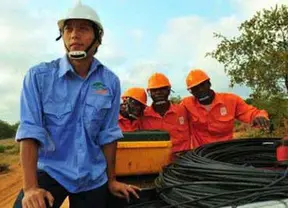
SouthKorea’srulingDemocraticPartyhasputforwardthepossibilityofreturningthecontroversialTHAADanti-missilesystemtotheUnitedStates.NationalAssemblymemberWooWon-shi
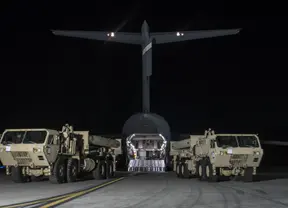
China reiterated on Tuesday its resolute opposition to the deployment of a US anti-missile defense system in the Republic of Korea after the system's first components arrived in the peninsula.
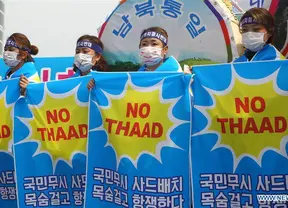
The United States intends to deploy the Terminal High Altitude Area Defense (THAAD) anti-missile system in South Korea "as soon as possible," a senior U.S. official said Tuesday.
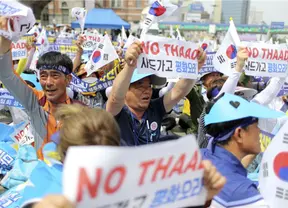
Splits continued among South Korean people over the deployment of a U.S. missile defense system in their soil on Monday that marks the 71st anniversary of the Korean Peninsula's liberation from Japanese colonial rule.

The Democratic People's Republic of Korea (DPRK) on Thursday once again slammed Seoul for its decision to deploy the anti-missile Terminal High Altitude Area Defense (THAAD) system on the Korea Peninsula, saying it is "dodging the mounting criticism."

South Korean President Park Geun-hye said on Thursday that where Terminal High Altitude Area Defense (THAAD) is sited can be re-considered, but it has nothing to solve over numerous controversies emerging since its deployment decision to its soil.

By deploying the Terminal High Altitude Air Defense (THAAD) anti-missile missile system in South Korea, Washington not only ties Seoul onto its chariot, but also casts a shadow of a new Cold War over Northeast Asia, to the detriment of regional peace and stability.
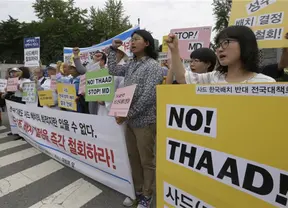
South Korean citizens, politicians and news organizations are raising a dissenting voice over the decision between Seoul and Washington to deploy Terminal High Altitude Area Defense (THAAD) in their homeland.
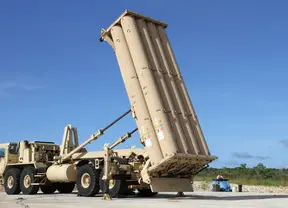
China and Russia on Thursday voiced serious concern over the deployment of the Terminal High Altitude Area Defense (THAAD) in South Korea.
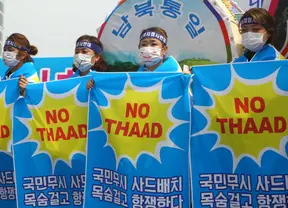
Decision between Seoul and Washington to deploy Terminal High Altitude Area Defense (THAAD) to South Korean soil caused an outcry from college students as they held a rally in central Seoul to block the war risks-escalating U.S. weapons system from being installed in their homeland.
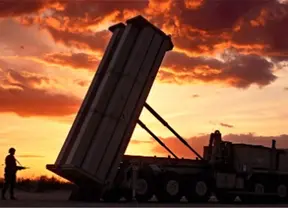
South Korea's decision to comply with the U.S. Pivot-to-Asia strategy by deploying the Terminal High Altitude Area Defense (THAAD) system may help the government draw public attention on security threats, experts here said.
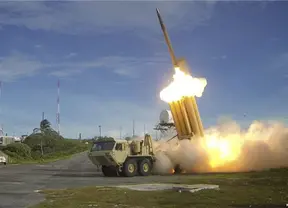
South Korea's defense ministry on Wednesday announced an agreement with the United States to deploy the U.S. missile defense system, called Terminal High Altitude Area Defense (THAAD), in its southeastern region despite continued oppositions from neighboring countries.
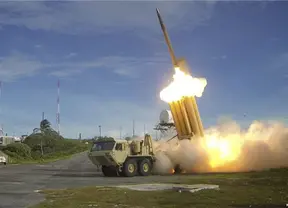
South Korea's defense ministry on Wednesday announced an agreement with the United States to deploy the U.S. missile defense system, called Terminal High Altitude Area Defense (THAAD), to its southeastern region despite continued oppositions from neighboring countries.
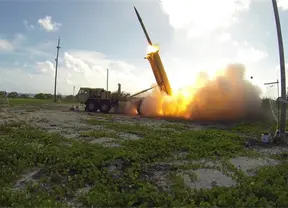
The army of the Democratic People's Republic of Korea issued a warning Monday that it will take "physical measures" against the deployment of the Terminal High Altitude Area Defense (THAAD) in South Korea by the United States.
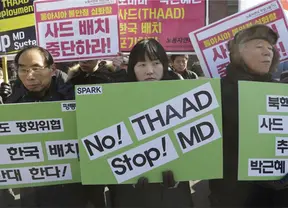
South Korean government officials on Monday sought to tout the need for deploying the U.S. missile defense system, called Terminal High Altitude Area Defense (THAAD),in its territory despite oppositions and controversies at home and abroad.

The Democratic People's Republic of Korea (DPRK) warned Monday that it will take "physical measures" to cope with the U.S. deployment of Terminal High Altitude Area Defense (THAAD) in South Korea.